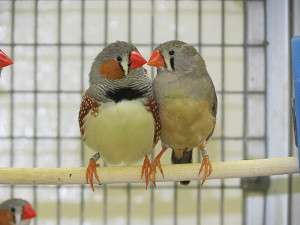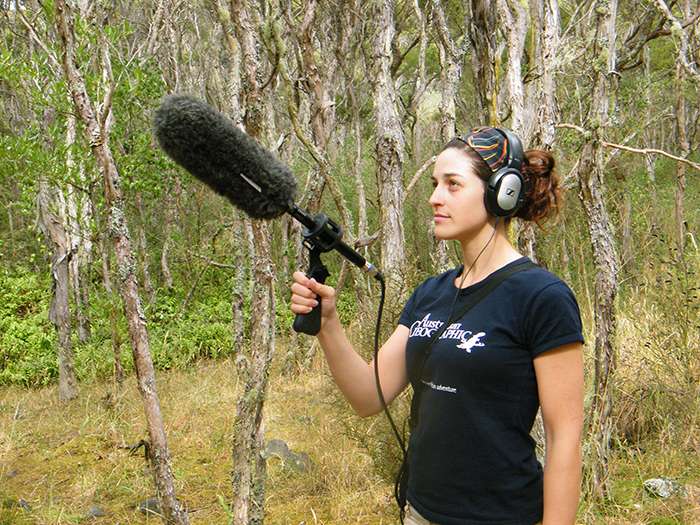Songbirds struggle against sounds of city

Humans can be a bit noisy. And while our racket has become second nature to us, songbirds are hoping we could keep it down a bit.
Research has shown some songbird populations do not reproduce as well in urban areas as they do in other, more quieter, locales. It seems our amped volume is triggering changes in the animals when it comes to their communication, incubation and the hatching of new birds.
Psychology professor Scott MacDougall-Shackleton, along with postdoctoral scholar Dominique Potvin, took to the acoustic chambers of Western's Advanced Facility for Avian Research (AFAR) to find out why.
Field studies in Europe and Australia found birds living in cities shift the pitch of their songs – even create different types of sounds – to compensate for the noise and improve communications with their mate. Other studies have suggested urban noise was disrupting birds' ability to communicate about food, mates and danger.
MacDougall-Shackleton, Director of AFAR, and Potvin focused on whether noise had an effect on reproduction. To do so, they used two groups of domesticated zebra finches – one group exposed to moderate levels of urban sound recorded at a city park; one group lived in peace and quiet. Just as wild birds demonstrated in previous studies, the tame finches living with the noise had a harder time reproducing. Fewer eggs hatched; the chicks that did emerge did not grow as well.

"We suspected that may be the case. But we were surprised by the strong numbers," said MacDougall-Shackleton, adding while the noise didn't completely block the birds from hearing each other, the results suggested noise somehow interfered with incubation. "The two groups laid eggs at the same time, but the ones living with the noise weren't hatching. Males and females both incubate. We suspect they weren't incubating as much. Or the noise was disrupting that communication when they switched. Or the noise of car horn could have caused one to jump off (the nest). When the babies did hatched, they were lighter. It suggests it was an effect.
"Some people don't do well in high-stress situations, while others thrive in them. The same thing happens in other species, too."
There are three general groups of birds – urban exploiters (e.g., house sparrows or starlings) that do relatively well in noisy places; urban avoiders (e.g., warblers) that avoid urban areas; and urban survivors (e.g., finches, orioles and sparrows) that can go either way in the urban environment.
Potvin said the most successful breeders have higher baseline levels of the avian stress hormone, corticosterone. In the quiet group used as a control, the birds had similar levels of success no matter the level of the hormone. In the noisy group, however, the high-corticosterone birds bred more successfully.
"We were most surprised to learn that noise did not necessarily cause a response in the levels of stress hormones circulating in the birds. Something that would indicate the birds were under chronic or constant stress," said Potvin, who received her master's degree in Biology at Western before completing her PhD at the University of Melbourne in Australia. "There has been a bit of previous research suggesting noise is stressful to animals. This may still be the case, but we aren't seeing the kind of physiological response we might expect in that regard."

Although birds in the noise group laid the same number of eggs, they were less likely to hatch. This was not because they were unfertilized; the embryos were dying in the egg.
"This usually occurs because of incubation issues – parents are not staying on the nest enough, for example," Potvin said. "We think the noise could have made the parents very nervous or otherwise disrupted their incubation, so that their nests were more likely to fail."
Part of larger body of research looking into why some birds are able to cope with urban environments and others cannot and simply leave, Potvin wants to find a way to improve the situation for all wildlife in urban areas.
"It's important that we use similar mitigation techniques and apply these strategies to urban natural areas, to encourage populations of birds and other animals to reside there and help them thrive," said Potvin, who has since returned to Australia to continue her postdoctoral work at the Australian National University.
MacDougall-Shackleton added everything we do affects the environment.
"One way to be smart about it is understanding that when you put in a road, it's not just that you paved over some land, there are other effects – lots of unintentional consequences," he said.
For Potvin, part of her excitement was being able to experience the facilities at AFAR, which she succinctly summed up as "amazing." She was finishing her masters when AFAR got its funding and go-ahead, but left before the facility was completed in 2009.
"To actually see it, and get to do research here, was just incredible. I've been around the world and there is little – if anything – to rival it," she said. "I couldn't have done these experiments without a place like AFAR. I was able to acoustically isolate my birds, have a flock of breeding finches available, experts in neurobiology and physiology helping me out, acoustic equipment, a terrific laboratory and very supportive colleagues that all went into making this study successful."
Provided by University of Western Ontario

















